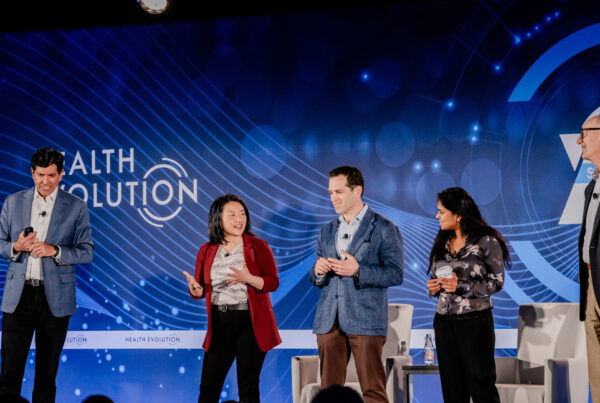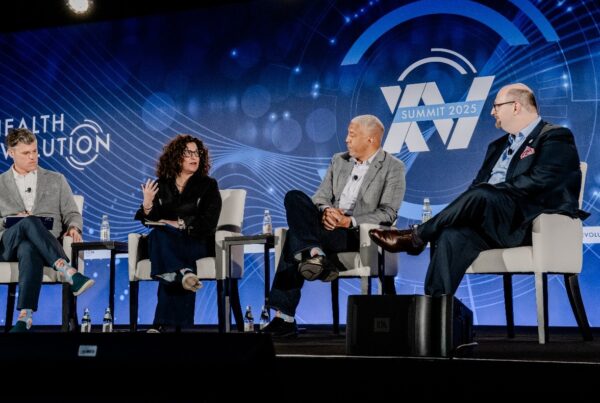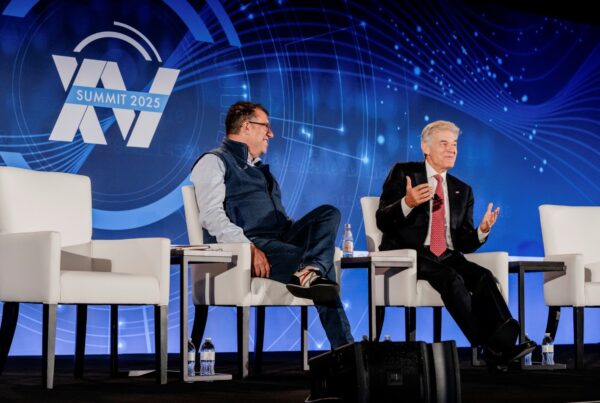Like mother, like daughter has taken on a new meaning for Feyi Olopade Ayodele.
Growing up, Ayodele had a front row seat to the potential power of cancer-related genomics through the work of her mother, Olufunmilayo (Funmi) Olopade, MD, a clinical oncologist, MacArthur Foundation “Genius” Grant award winner, and Founder of the Clinical Cancer Genetics Program at the University of Chicago Medicine.
“She has long believed that the future of oncology has got to be preventive in nature. We can do a lot to treat patients in late stages and pour a ton of money into those treatments, but what’s going to save more lives from cancer is detecting it early or preventing it altogether,” said Ayodele, who spent years as a management consultant, investor, and investment banker at McKinsey, Actis, and Credit Suisse, before switching gears in 2012 to commercialize the work of her mother.
For 10 months, she worked under her mother at the University of Chicago, using analog-based methods to determine which patients had a high risk for cancer. Her mom would go through family histories, leverage multispecialty care teams, and use genetics to assess a patient’s risk for cancer.
“Coming from financial services and other tech-enabled industries that have ridden the wave that health care is going through now, I saw the work my mom was doing as incredibly impactful but wildly unscalable. What funded her risk clinic was wealthy patients, grant donations and students/fellows and volunteers. For this to work at everyday provider organizations, you needed something that could be done without pen, paper and manual processes.”
That’s the mentality that led to CancerIQ, the enterprise genomics software company that both mother and daughter started almost 10 years ago. Ayodele says CancerIQ aims to integrate genetic-based cancer risk assessments into a clinician’s workflow, while embedding content that’s easy to interpret so that anyone could stand up a cancer risk clinic across the country. She calls the system’s platform “Turbo Tax” for genetic-based clinical decision support, trying to simplify the process for clinicians.
“If there is a really complex workflow and you have to do things the manual way, providers aren’t going to do it,” she said. “One of the key learnings we’ve had in our journey is that in order to capture the attention of the primary care physician, who might not have a lot of knowledge on genomics, is that this needs to be embedded into their clinical workflow.”
COVID introduces a new era of genomics
Over the last 10 years, the role of genomics in health care has gradually gone from the lab to the clinic. An August 2020 report from University of Pittsburgh Medical Center’s Center for Connected Medicine found that two-thirds of health systems have—or will have—an enterprise-level strategy in place for genomics and nine-out-of-10 organizations are offering or planning to offer genome sequencing. The number of companies offering genomics as a service have seen a six-fold increase in funding since 2013.
Read more: Can genomics and precision medicine initiatives deliver in the post-COVID world?
Thanks to COVID, Ayodele says there is an even greater appetite for genomics within health care. Not only have messenger RNA (mRNA) vaccines been developed in record time, but there is a greater awareness of at-risk patients. She says providers are increasingly concerned about even average risk patients who haven’t come in for colon screenings or mammograms.
According to a study from the CDC in June, early detection screening tests declined by 87 percent for breast cancer and 84 percent for cervical cancer during the early months of COVID. Another study, from Health Care Cost Institute, saw similar declines for mammograms and colonoscopies.
“While we’ve gone into this world where everyone can get genetically-informed care, we have come out of this pandemic trying to ensure people are just getting the right cancer preventive care in the first place,” Ayodele says.
Some health systems are trying innovative approaches. Researchers say that home-based genetic screening tests have become more popular for colon cancer. Adventist Health, based in California, was able to increase cancer screenings during COVID by proactively reaching out to patients who were flagged as high risk.
“What has paved the way for rapid innovation in the last year is health systems appreciating the importance of using technology to get to patients before they get sick at a time when hospitals are filling up with COVID patients. Your most vulnerable patients, who either have a predisposition to cancer or are cancer survivors, they are nervous about coming in,” she added.
One size does not fit all
Ayodele says one-size-fits-all solutions doesn’t work well with cancer prevention and that any health system going down this route should reconsider. She says there are so many shades of being at risk for a predisposition to cancer that it requires personalized techniques.
“Just like precision medicine allowed for more targeted therapies to treat cancer, precision prevention is starting to take off because there are more early-detection and prevention strategies. There’s Grail with their Galleri test. There’s going to be a patient population at a certain level of risk that will need that kind of test,” Ayodele said. “There are just a lot of options and tests that can help health care organizations get ahead of cancer and detect it in its earlier stages.”
She says that this kind of service can help health systems achieve their goals of health equity. Certain patient populations are at greater risk for specific types of cancer. In fact, according to the National Cancer Institute, Blacks have “higher death rates than all other racial/ethnic groups for many, although not all, cancer types.”
Some health systems are addressing this challenge, Ayodele says, by scaling the availability of genetic counselors to all patients, while others are trying primary care physicians to act as a de facto guide for patients in prevention. Either way, it’s imperative for the incumbent health system to address this issue for patients, she says, and take an enterprise-wide approach to cancer prevention.
“More and more health systems are facing competition in primary care. There’s a lot of innovation there. There are the rapid alternatives. The place where we have to rely on health systems is in oncology where there is going to be a need for almost every service a health system offers to be delivered. Cancer is going to be the biggest fight in medicine where our health system is going to have to fight. That’s where our health system will need to shine,” Ayodele says.











